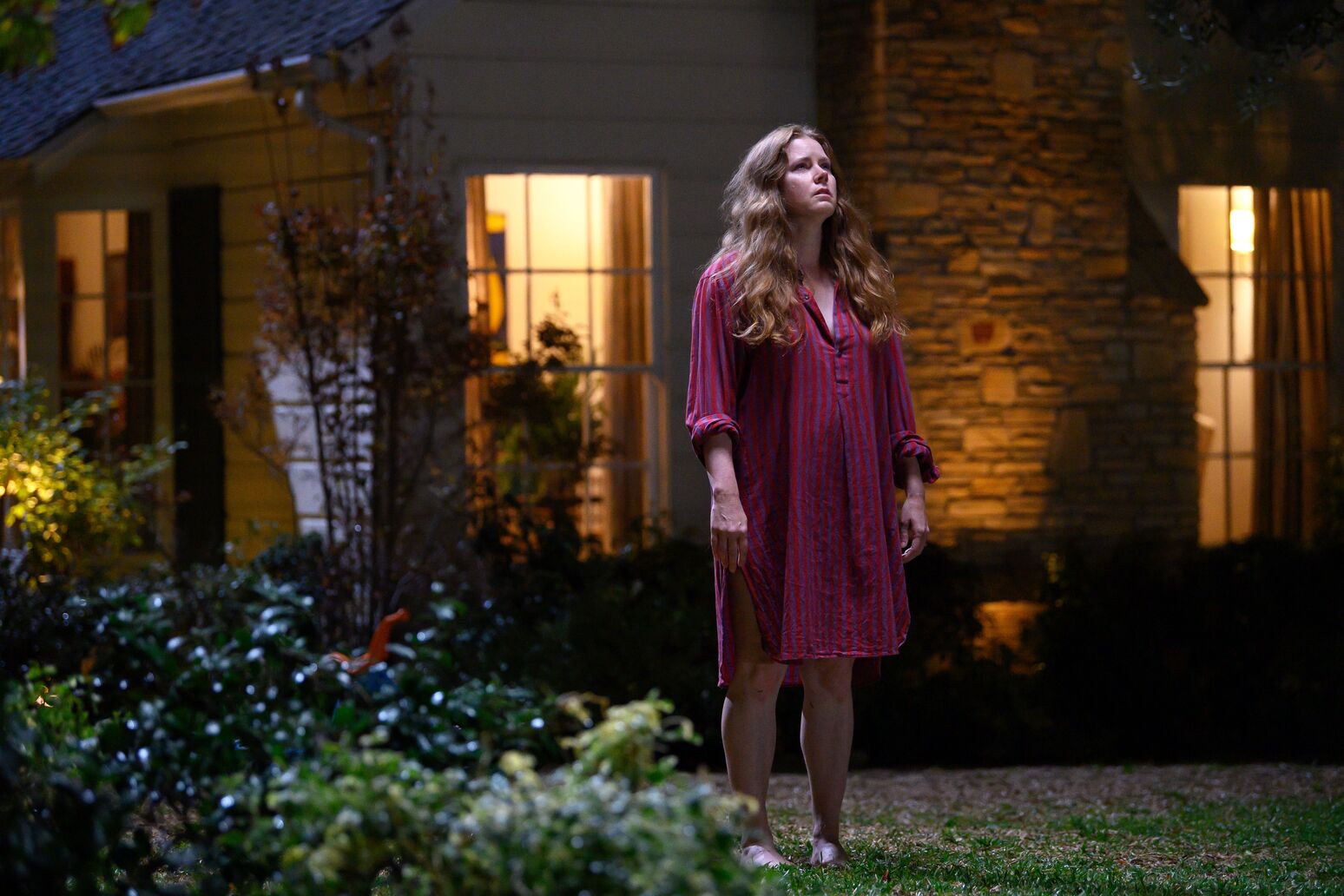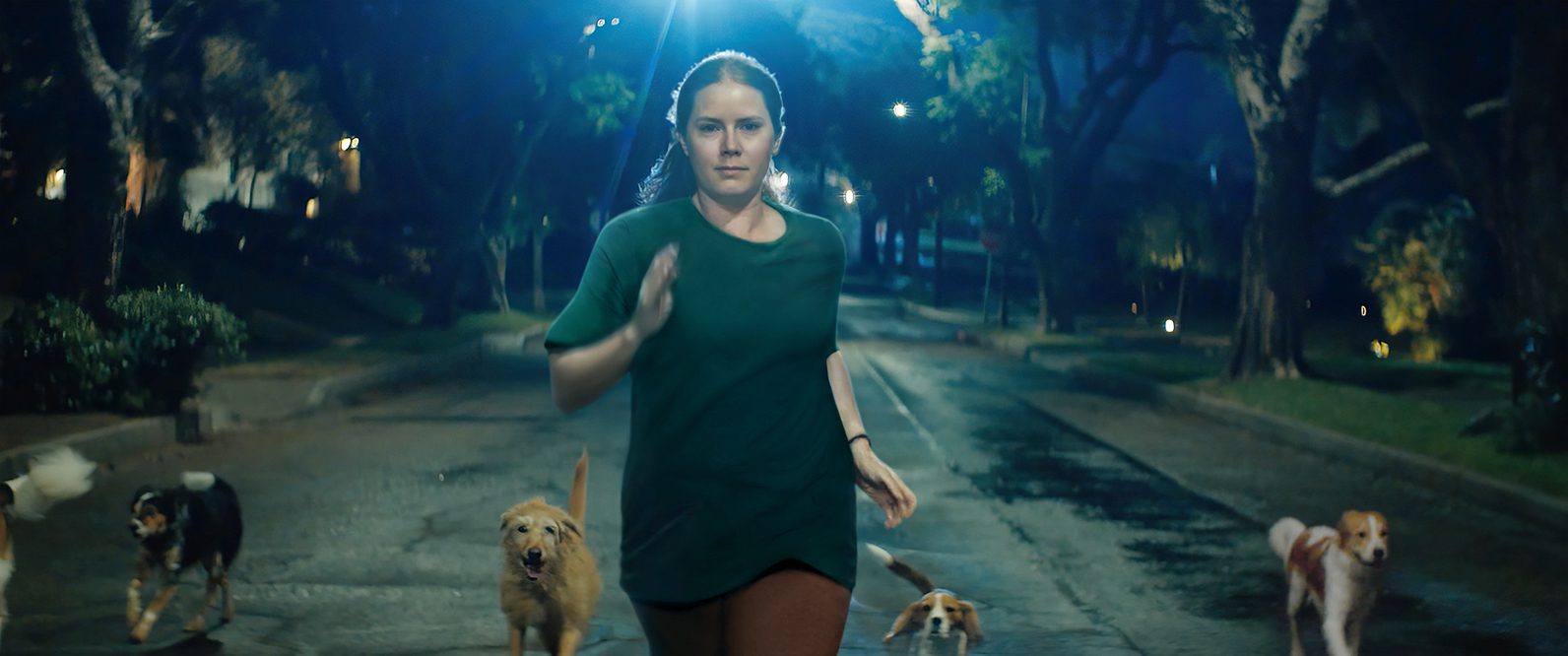
Nightbitch, written and directed by Marielle Heller and based on Rachel Yoder’s novel, plunges into the surreal chaos of motherhood through a lens of magical realism. The film follows Amy Adams as a suburban stay-at-home mom grappling with isolation, identity, and an uncanny transformation into a dog. Despite its fascinating premise and Adams’ magnetic performance, Nightbitch struggles to fully embrace its bizarre narrative, leaving viewers both intrigued and frustrated.
Table of Contents
A Mother’s Transformation: The Story and Its Metaphor
At its core, Nightbitch is a dark exploration of the emotional toll and primal instincts tied to motherhood. The unnamed protagonist, played by Adams, is a former art professional who abandons her career to care for her toddler. She is soon swallowed by the monotony and loneliness of suburban life, while her husband (Scoot McNairy) remains emotionally and physically distant, frequently traveling for work.
As the pressures of motherhood mount, she begins noticing strange physical changes—a patch of fur on her back, heightened senses, and a sudden, almost feral craving for raw meat. What initially feels like a surreal metaphor for losing oneself to caregiving duties morphs into a literal transformation. This lycanthropic twist parallels her journey toward reclaiming her power and identity, as she embraces the raw, untamed parts of herself she had long suppressed.
The metaphor is striking: motherhood often demands a shedding of individuality and a recalibration of identity, much like the protagonist’s visceral metamorphosis. However, the film’s refusal to fully commit to its fantastical premise undermines its potential. At times, it feels caught between arthouse meditation and horror-inflected magical realism, diluting its emotional impact.
Amy Adams: A Transformative Performance in a Conflicted Role
Amy Adams delivers a deeply raw and unsettling performance, embodying the visceral vulnerability and rage of a woman unraveling under societal and personal expectations. Her physicality, particularly in the scenes that depict her dog-like behaviors, is startlingly committed and unsettlingly believable. Adams’ nuanced portrayal brings depth to a character who oscillates between resignation, rage, and liberation.
However, the character itself is underdeveloped. While we glimpse her inner turmoil, her arc feels incomplete, as if the screenplay shied away from fully exploring the implications of her transformation. Adams gives the role her all, but even her brilliance can’t compensate for the script’s shortcomings.

Direction and Visuals: A Striking but Uneven Vision
Marielle Heller, known for her grounded storytelling in “The Diary of a Teenage Girl” and “A Beautiful Day in the Neighborhood,” takes a daring leap into surrealism with Nightbitch. Her direction is most effective when capturing the suffocating mundanity of suburban motherhood—endless days of diapers, playdates, and sleepless nights. The house, sterile and lifeless, mirrors the protagonist’s internal despair.
The visual depiction of the protagonist’s transformation is both grotesque and fascinating, with subtle but unnerving effects used to suggest her physical changes. The use of lighting, shadows, and close-up shots creates a haunting atmosphere that heightens the tension. However, the film falters in balancing its surreal elements with its grounded storytelling. Moments that should feel daring and transformative instead come off as restrained, as if the film is hesitant to fully commit to its strangeness.
A Lack of Narrative Cohesion
The primary flaw in Nightbitch lies in its uneven pacing and narrative focus. The first act is compelling, capturing the slow unraveling of the protagonist’s psyche. However, as the film progresses, the narrative becomes disjointed, and key elements—like the protagonist’s relationship with other mothers in the community or her husband’s growing unease—feel underexplored. The climax, which should be cathartic and revelatory, instead feels rushed and unsatisfying, leaving thematic threads dangling.
The film’s tonal inconsistency also hampers its effectiveness. At times, it leans into dark comedy, poking fun at the absurdity of its premise, while at other moments, it dives into psychological horror. This tonal whiplash makes it difficult to emotionally connect with the story.
Scoot McNairy: A Supporting Role with Minimal Impact
As the protagonist’s husband, Scoot McNairy delivers a competent but unremarkable performance. His character functions more as a narrative device than a fully realized individual, embodying the absent partner who unintentionally exacerbates the protagonist’s isolation. While McNairy conveys a subtle undercurrent of concern and confusion, the lack of development for his character limits his impact on the story.
Conclusion: A Mixed Bag of Potential and Restraint
Nightbitch offers a bold, provocative exploration of motherhood’s primal and transformative nature, anchored by Amy Adams’ fearless performance. Yet, the film’s reluctance to fully embrace its fantastical premise and its uneven narrative structure prevent it from achieving its full potential. For viewers seeking a dark, surreal take on maternal struggles, “Nightbitch” provides moments of brilliance, but it ultimately feels like a missed opportunity to deliver a truly groundbreaking story.
Would I recommend it? Yes, but with reservations. Nightbitch is worth watching for its ambition and Adams’ performance, but don’t expect it to leave a lasting bite.
About “Nightbitch”
Synopsis: A woman, thrown into the stay-at-home routine of raising a toddler in the suburbs, slowly embraces the feral power deeply rooted in motherhood, as she becomes increasingly aware of the bizarre and undeniable signs that she may be turning into a dog.
Director(s): Marielle Heller
Writer(s): Marielle Heller. Rachel Yoder
Cast: Amy Adams, Scoot McNairy, Arleigh Snowden, Emmett Snowden
Rated: R
Runtime: 1h 39m
Releases: December 6, 2024

he/him • aapi • intj • geek • photographer • journalist • podcaster • martial artist • foodie • dj • cinephile • gamer • traveler






























